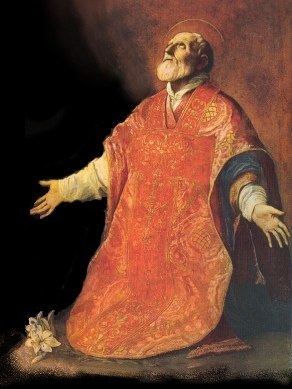Posted on May 19, 2018 View all news
 May 19 – Philip’s Humility
May 19 – Philip’s Humility
If Philip heard of anyone having committed a crime, he would say, “Thank God that I have not done worse.”
At confession he would shed abundance of tears, and say, “I have never done a good action.”
When a penitent showed that she could not bear the rudeness shown towards him by certain persons who were under great obligations to him, he answered her, “If I were humble, God would not send this to me.”
When one of his spiritual children said to him, “Father, I wish to have something of yours for devotion, for I know you are a Saint,” he turned to her with a face full of anger, and broke out into these words: “Begone with you! I am a devil, and not a saint.”
To another who said to him, “Father, a temptation has come to me to think that you are not what the world takes you for,” he made answer: “Be sure of this, that I am a man like my neighbours, and nothing more.”
If he heard of any who had a good opinion of him, he used to say, “O poor me! how many poor girls will be greater in Paradise than I shall be!”
He avoided all marks of honour. He could not bear to receive any signs of respect. When people wished to touch his clothes, and knelt as he passed by, he used to say, “Get up! get out of my way!” He did not like people to kiss his hand; though he sometimes let them do so, lest he should hurt their feelings.
He was an enemy to all rivalry and contention. He always took in good part everything that was said to him. He had a particular dislike of affectation, whether in speaking, or in dressing, or in anything else.
He could not bear two-faced persons; as for liars, he could not endure them, and was continually reminding his spiritual children to avoid them as they would a pestilence.
He always asked advice, even on affairs of minor importance. His constant counsel to his penitents was, that they should not trust in themselves, but always take the advice of others, and get as many prayers as they could.
He took great pleasure in being lightly esteemed, nay, even despised.
He had a most pleasant manner of transacting business with others, great sweetness in conversation, and was full of compassion and consideration.
He had always a dislike to speak of himself. The phrases “I said,” “I did,” were rarely in his mouth. He exhorted others never to make a display of themselves, especially in those things which tended to their credit, whether in earnest or in joke.
As St. John the Evangelist, when old, was continually saying, “Little children, love one another,” so Philip was ever repeating his favourite lesson, “Be humble; think little of yourselves.”
He said that if we did a good work, and another took the credit of it to himself, we ought to rejoice and thank God.
He said no one ought to say, “Oh! I shall not fall, I shall not commit sin,” for it was a clear sign that he would fall. He was greatly displeased with those who made excuses for themselves, and called such persons. “My Lady Eve,” because Eve defended herself instead of being humble.
Prayer
Philip, my glorious patron, who didst count as dross the praise, and even the good esteem of men, obtain for me also, from my Lord and Saviour, this fair virtue by thy prayers. How haughty are my thoughts, how contemptuous are my words, how ambitious are my works. Gain for me that low esteem of self with which thou wast gifted; obtain for me a knowledge of my own nothingness, that I may rejoice when I am despised, and ever seek to be great only in the eyes of my God and Judge.
